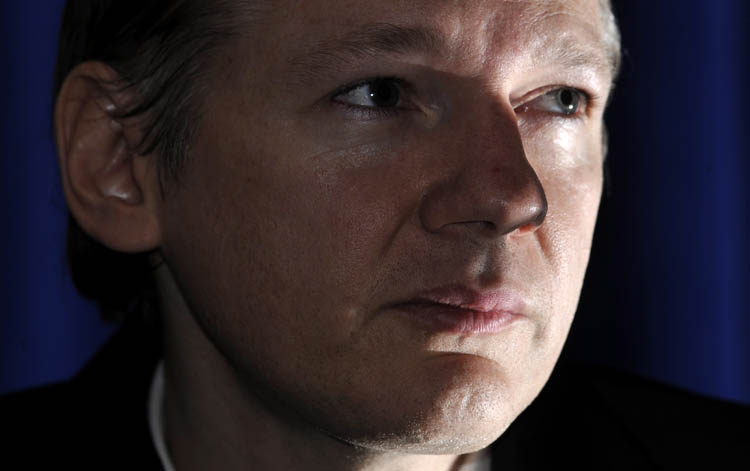LONDON — Wikileaks struggled to stay online Friday as corporations and governments moved to cut its access to the Internet, a potentially crippling blow for an organization dedicated to releasing secret information via the web.
Legal pressure on the site’s founder Julian Assange also increased, with Swedish authorities refiling a European arrest warrant over allegations of sexual misconduct. Assange, who is in Britain, could face arrest imminently – although his lawyer Jennifer Robinson said she’d yet to be served with a warrant.
Assange, for his part, said that his arrest would do nothing to staunch the flow of diplomatic cables, saying that the information had already been distributed – in a heavily-encrypted form – to tens of thousands of Internet users.
If something happened to him, he suggested, then the password needed to unencrypt the data would be released and all the secrets would go out at once.
“History will win,” Assange said in a Web chat with readers of The Guardian newspaper, one of the media organizations which is helping to coordinate the documents’ publication. “The world will be elevated to a better place. Will we survive? That depends on you.”
As the contents of hundreds of secret diplomatic cables reverberate around the world, WikiLeaks is facing increasing difficulties staying online.
Manchester, New Hampshire-based company EveryDNS, which had been directing traffic to the website wikileaks.org – stopped doing so late Thursday after cyber attacks threatened the rest of its network. WikiLeaks responded by moving to a Swiss domain name, wikileaks.ch – and calling on activists for support. Two companies host the Swiss domain name, one of which is in France. The other is in Sweden.
But the site is being challenged in France too. Today officials there moved to ban WikiLeaks from French servers, with Industry Minister Eric Besson calling it unacceptable to host a site which “violates the secret of diplomatic relations and puts people protected by diplomatic secret in danger.”
Meanwhile, WikiLeaks is being chased around the Internet by hackers and governmental pressure. For now, it’s one step ahead of the opposition, but the site has been brought down numerous times over the course of a week.
WikiLeaks appears to have become the target of several denial-of-service attacks. In a typical such attack, remote computers commandeered by rogue programs bombard a website with so many data packets that it becomes overwhelmed and unavailable to visitors. Pinpointing the culprits is difficult. The attacks are relatively easy to mount, and can be performed by amateurs.
The attacks started Sunday, just before WikiLeaks released the diplomatic cables. To deal with the flood of traffic, WikiLeaks moved to Amazon.com Inc.’s Web hosting facility, which has vast numbers of servers that can be rented at need to meet surges.
Amazon booted the site on Wednesday after U.S. Congressional staffers started asking the company about its relationship to WikiLeaks. The company later said it ousted WikiLeaks because WikiLeaks doesn’t own its content and Amazon claimed it could be endangering innocent people by publishing unredacted material. WikiLeaks has rejected the charge.
EveryDNS did not immediately respond to phone and e-mail messages seeking further comment, but its move to pull the plug on WikiLeaks’ domain isn’t fatal by any means. DNS stands for “Domain Name System,” and it acts like a phone book for the Internet, translating a domain name like WikiLeaks.org into a number that points to a specific host computer.
Even if DNS is not working, visitors can still find the site by going to the numerical address.
For a tech-savvy organization like WikiLeaks, loss of DNS support is just a minor annoyance because the site can leap from one name to the next, said Fraser Howard, a researcher with Internet security firm Sophos.
“The whack-a-mole analogy is fairly good,” he said.
WikiLeaks said it was fighting for its survival.
“The first serious infowar is now engaged. The field of battle is WikiLeaks. You are the troops,” Electronic Frontier Foundation co-founder John Perry Barlow said in a tweet reposted by WikiLeaks to its 300,000-odd followers.
Meanwhile the United States has what Attorney General Eric Holder calls “an active, ongoing, criminal investigation” into WikiLeaks’ release of the diplomatic cables. Holder said this week that the release jeopardized national security, diplomatic efforts and U.S. relationships around the world. Assange also risks legal action in his homeland, where Australia says it would detain Assange if possible in response to the warrant filed in the Swedish case by Interpol.
The attacks don’t seem to have hampered Assange’s ability to get his point across. Speaking to Internet users today, Assange offered fulsome praise of the Army intelligence analyst thought to be behind the massive leak.
“If indeed it is the case, as alleged by the Pentagon, that the young soldier – Bradley Manning – is behind some of our recent disclosures, then he is without doubt an unparalleled hero.”
Send questions/comments to the editors.



Success. Please wait for the page to reload. If the page does not reload within 5 seconds, please refresh the page.
Enter your email and password to access comments.
Hi, to comment on stories you must . This profile is in addition to your subscription and website login.
Already have a commenting profile? .
Invalid username/password.
Please check your email to confirm and complete your registration.
Only subscribers are eligible to post comments. Please subscribe or login first for digital access. Here’s why.
Use the form below to reset your password. When you've submitted your account email, we will send an email with a reset code.